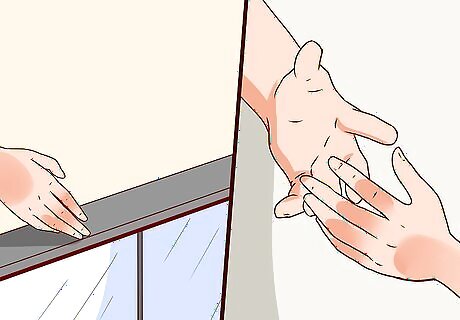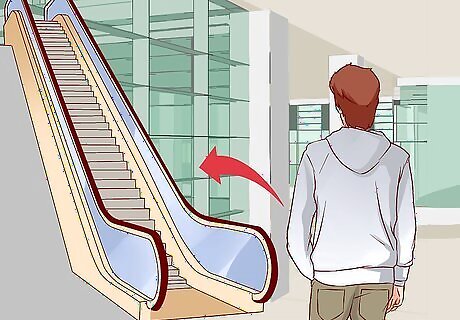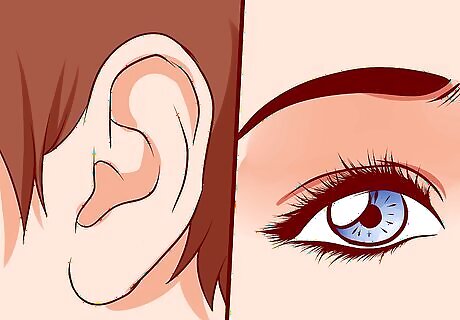
views
X
Research source
If you have escalaphobia, you may feel trapped when you are at the top of the escalator and feel like you might fall or tumble down the escalator. You may also have a rapid heartbeat, a hot flushed feeling, a shortness of breath, and sudden trembling when you try to step onto the escalator. To cope with your fear, you may avoid escalators all together in malls, subways, office buildings, and other public spaces. Keep in mind adjusting your escalator riding habits is useful when you have a general fear of escalators, rather than a true phobia. If you suffer from escalaphobia, you will likely need to try professional therapy.
Adjusting Your Habits

Look ahead, rather than down, when on the escalator. Avoid making eye contact with the moving stairs and keep your gaze straight ahead as you ride the escalator. This will help you stay still on the escalator so you can get to your destination. This will also reduce any dizziness you might feel when riding the escalator.

Hold the railing or someone’s hand. Use the side railings to steady yourself on the escalator and to prevent getting dizzy. You can also travel with someone that will hold your arm as you ride the escalator. This can help with your sense of balance and perception of depth while on the escalator. Some people who suffer from a fear of escalators find wearing practical, sturdy shoes while on an escalator can give them a sense of security and comfort.

Take the escalator when it is empty. Some people with a phobia of escalators dislike feeling trapped or boxed in, surrounded by others on the escalator during a busy time of day, or rush hour. Rather than try to ride a crowded escalator, wait until the crowd thins out. This may help you feel less crowded and trapped while riding the escalator.
Using Therapy

Consider cognitive behavioral therapy (CBT). This psychotherapy focuses on adjusting inaccurate or negative thinking so you can view fears or phobias with a clear mind and respond to them in an effective way. You will work with a psychotherapist in a limited number of sessions to treat your escalaphobia and come up with solutions to help you overcome your fear. Your therapist might help you overcome your fear through a progression of steps, like standing on the first step of an escalator that's turned off. To try CBT, get a referral for a psychotherapist from your doctor, your health insurance plan, or a friend or family member who has experienced a good CBT session. If you have health insurance, find out what your plan offers for coverage of psychotherapy. Before you agree to a session with a therapist, check the fees and payment options for the sessions. You should also confirm the psychotherapist’s qualifications before you go to the session. Look up her education, certification, and licensing. Most trained psychotherapists have a master’s or a doctoral degree, with training in psychological counseling.

Look into exposure-based treatment. This type of therapy places you in a situation where you confront your phobia in a controlled manner. Your therapist will also prevent you from avoiding your fear and may use other interoceptive cues, such as internal physical sensations. Most exposure-based treatments are therapist assisted to help you tolerate the fear and anxiety you associate with a certain experience or object. For example, your therapist may expose you to escalators in increments. Once you become comfortable standing over an escalator, for example, your therapist may then have you put one foot on the escalator and then slowly get comfortable to put both feet on the escalator. Placing yourself next to an escalator and then on an escalator, with your therapist present, will help you learn that any feared consequences of escalators you might imagine will not occur.

Try hypnosis. Hypnotherapists believe that your subconscious mind sometimes reacts inappropriately to specific situations, for example, riding an escalator. Hypnotherapist try to change the responses in your subconscious mind to find new ways for you to react to certain situations and to release you from your fears and phobias. Hypnosis for escalaphobia can be done in one initial session with the use of exposure through imagined flooding, in which the therapist guides you through an imaginary experience on an escalator while you are deeply relaxed. There is usually a follow up session to see if your fear is still in remission. Ask your doctor for a referral to a certified hypnotherapist and look them up online before you make an appointment. You can also ask friends and family if they have been to good hypnotherapist for any of their fears or phobias. Please keep in mind that the usefulness of hypnotherapy has been a subject of controversy within the medical community, and it may work better for people who are more suggestible.

Try Eye Movement Desensitization and Reprocessing (EMDR). This therapy was originally used to treat PTSD, and has been adapted to treat specific phobias. During EMDR, you will be exposed to brief images of the feared object or situation and be directed by a therapist to practice eye movements, listen to tapping, or rhythmic tones. The purpose is to decondition you of your phobia through rapid eye movement and processing of images of the feared situation or object. Some experts argue that EMDR is more useful for the treatment of fears that developed out of trauma, so this might be most effective if your fear is rooted in a bad experience with an escalator. Many people with phobias will try hypnosis or exposure based therapy before they try EMDR.
Speaking to Your Doctor

Get your ears and eyes checked. Sometimes, people who have difficulty staying balanced on escalators, or experience vertigo as they go down the escalator can have ear or eye issues. Get your eyes checked for any visual issues that may be causing imbalance or unsteadiness, and ask your doctor to check your ears for any issues that may be causing vertigo.

Ask for an official diagnosis. Your doctor can diagnose your phobia based on your symptoms, as well as your medical, psychiatric, and social history. Be prepared to answer questions in a clinical interview about your fear of escalators and the severity of your fear. The clinical definition of a phobia is a fear of an object or experience that is consistent for six months or more. You may experience panic attacks when exposed to the object or the experience, as well extreme distress or anxiety. You will likely recognize that your fear is irrational or unreasonable and be bothered that you cannot move past your phobia. Finally, your fear may so strong you will adjust your daily routine, your social life, or your work life to avoid confronting your phobia. Once your doctor gives you an official diagnosis of escalaphobia, you can use this to get coverage for therapies and treatment for your issue.

Get a referral for a therapist. Your doctor can refer you to a certified psychologist, a cognitive behavior specialist, or even a hypnotherapist. Discuss these options, as well as the pros and cons of each option, before you agree to treatment.




















Comments
0 comment